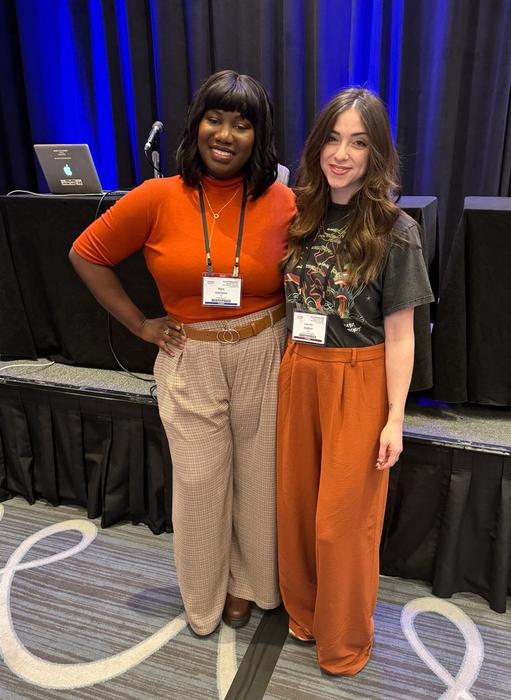Hormonally.org is a digital platform that provides free-to-access, evidence-based resources designed to empower women (and all those affected by hormones) to seek the appropriate care, treatment, and support they deserve. Hormonally’s mission is to make access to information on women’s hormonal health a more equitable experience for all.

Credit: Hormonally.org
Hormonally.org is a digital platform that provides free-to-access, evidence-based resources designed to empower women (and all those affected by hormones) to seek the appropriate care, treatment, and support they deserve. Hormonally’s mission is to make access to information on women’s hormonal health a more equitable experience for all.
The new nonprofit organization offers accessible information and a safe place to discuss and discover everything from the first period to post-menopause. Hormonally encourages women to proudly reclaim the word “hormonal” and in doing so, reduce negativity surrounding women’s hormonal health.
Hormonal? Absolutely!
Calling out stigma connected to the phrase ‘being hormonal,’ Hormonally is highlighting the vital role hormones play in women’s health and wellbeing throughout their lives.
By empowering women to reclaim ‘hormonal,’ the new nonprofit addresses stigma and encourages women to seek education, care, and treatment for hormonal health issues.
The launch of Hormonally.org
Rooted in the understanding that there is a major unmet need regarding hormone education, Hormonally was founded by a team of women’s health experts. The digital platform hormonally.org sets the record straight on a variety of topics including PMS, pregnancy, menopause, hormones and mental health, endometriosis, fibroids, and conditions such as polycystic ovary syndrome, or PCOS.
Replacing obscure medical jargon with accessible content, the nonprofit’s website has been designed to encourage readers from all backgrounds to be curious. Resources break down complex topics in a relatable way, asking women to do the unthinkable: love their hormones!
“Hormonally isn’t just another website — it’s a movement dedicated to breaking down the barriers women face every day trying to understand their mental, physical, and emotional health,” Executive Director Lauren Redfern, Ph.D., said. “We want to create a safe space where open conversations are encouraged, and trustworthy information is accessible to everyone.”
Redfern’s own health struggles and academic research into hormones helped her realize how complex the hormonal battleground is for every woman. While completing a doctorate exploring women’s experiences of using testosterone as part of their treatment for menopause, Dr. Redfern heard countless accounts of women having their symptoms written off as mental health problems.
Hormones are personal
Many women report having their hormonal health issues dismissed by health care professionals, meaning serious conditions can often be ignored by sufferers and left undiagnosed for many years, which can cause serious harm.
Isidora, a 27-year-old from Boston, experienced this.
“For as long as I can remember, my periods were different,” she said. “Not just a few cramps and mood swings — I’m talking pain that would leave me doubled over, missing school and social events. Doctors consistently told me my symptoms were just ‘normal period pain,’ but I knew what I was experiencing wasn’t normal. Years of misdiagnoses and dismissive appointments left me feeling unheard and alone. Finally, at 22, after a particularly intense episode of pain, I landed in the ER and was referred for a laparoscopy. My suspicions were confirmed. I wasn’t experiencing ‘normal period pain’; I had widespread endometriosis.”
Isidora’s story is sadly not an uncommon one. Due to misinformation surrounding women’s health issues, pain is often regarded as an expected part of the menstrual cycle, as opposed to a cause for concern.
Fighting misinformation about women’s hormones
Fighting misinformation about women’s hormones and explaining what hormones are and how women can seek support help to remedy conditions that put women at risk. Hormonally recognizes that while we cannot address systemic barriers or change healthcare systems overnight, we can give women the tools needed to engage in informed, shared decision-making when seeking care.
“For too long women have been gaslit about the effect of their hormones on their bodies and their brains, and Hormonally is reclaiming that space at last,” Kate Muir, author of Everything You Need to Know About the Menopause (and were too afraid to ask) and the producer of the documentaries Sex, Myths and the Menopause and Pill Revolution said. “Once we start looking at our health through hormonal glasses, from puberty to perimenopause and on, we see what a profound effect hormones have, and how little research there is in so many areas.”
Hormonally fosters a supportive online community that provides a space for women to share experiences and connect with others. Delivering insights in a relatable format, this nonprofit holds promise for advancing women’s health, literacy, and outcomes.
Follow Hormonally on its social media channels:
Instagram (@hormally.us)
LinkedIn (Hormonally).
About: Hormonally’s mission is to make access to information on women’s hormonal health a more equitable experience for all. Hormonally.org is a digital platform that provides free-to-access, evidence-based resources designed to empower women (and all those affected by hormones) to seek the care, treatment, and support they deserve. The work of Hormonally is maintained through philanthropic donations, and the organization has no affiliated relationship with the pharmaceutical industry or companies that do not have women’s best interests at heart. Hormonally is a project of the Parsemus Foundation, a nonprofit private foundation creating meaningful improvements in human and animal health and welfare by advancing innovative and neglected medical research.
Visit www.hormonally.org for more information.




